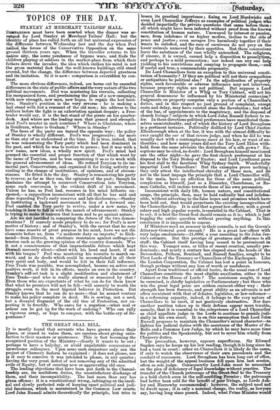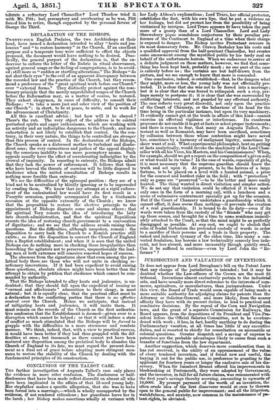TM, G - R - F, A T SEAL BILL.
IT is mostly found that servants who have grown above their places, or ceased to value them, are careless about giving satis- faction to their masters or mistresses. This is fast becoming the recognized position a the Ministry—clearly it wants to be out ; perhaps to have a holyday, or avoid unpalatable concessions or =welcome colleagues. Upon. some such conjecture only can the project of Chancery Reform be explained : it does not please, nor is it easy to conceive it was intended to please,. in any quarter ; having the very great defect of not removing any of the admitted evils of Equity, but of creating new or aggravating old ones. The leading-objections that have been put forth to the Chancel- lorship are, its-. multiform duties, the unsatisfactory discharge of them, and their incompatibility. The last mom than any has given offence : it is a constitutional wrong, infringing on the-cardi- nal and slowly perfected rule of keeping apart political and jail.- , cial functions, which is maintained in the Common Law courts. Lord John Russell admits theoretically the principle, but tries to lessen its practical importance ; fixing on Lord Hardwicke and even Lord Chancellor Jeffreys as examples of political judges who decided impartially the private questions that came before them : all which might have been inferred without proof from the known constitution of human nature. Unswayed by interest or passion, men, from indolence if no higher motive, incline to the side of peace and justice ; even savages live harmlessly together if their wants be satisfied, and the race of carnivore do not prey on the- lesser animals unmoved by their appetites. But these concessions leave the substance of the case wholly untouched. The religious, if sincere, it is owned, cannot help a disposition to proselytism, and perhaps to a mild persecution; nor indeed can any one help yielding to his convictions and essaying to propagate them,—and if useful and true, a commendable propensity. Do Lord Chancellors form an exception to this universal consti- tution of humanity ? If they are political will not their sympathies or antipathies be political also ? In the adjudication of property rights, such favourable or adverse influences may not intervene, because property rights are not political. But suppose a Lord Chancellor is Minister of aor Tory Cabinet, will not his general demeanour be influenced his kinisterial connexion? Judgments on property comprise only a portion of a Chancellor's duties and in this respect no just ground of complaint, except costs-and delay, may have existed since the Revolution' but what of the bar, of appointments to the magistracy, and the disposal of church livings ? subjects to which Lord John Russell forbore to re- fer. In these directions political preferences have manifested them- selves unmistakeably, and of which the history of Lord Brougham' is a pertinent instance. Politically disliked by Lord Chief Justice Ellenborough when at the bar, it was with the utmost difficulty he ever caught the ear of that severe judge, and when he did he was usually met with a contemptuous sneer at his law, or want of au- thorities; and how many years did not the Tory Lord Eldon with- hold from the same advocate the distinction of a silk gown ? Ex- ceptions may be cited, no doubt : Lord Brougham himself mentioned: one the other night—he gave the first church preferment at his- disposal to the Tory Bishop of Exeter; and Lord Lyndhurst gave- his first stall to the facetious Whig Sydney Smith. Wonderfully impartial Lord Chancellors ! But the examples prove nothing-i. they. only attest the intellectual chivalry of those men, and de not in the least impugn the principle that a Lord Chancellor will; in the main, have an affection for those of the same political complexion as himself, just as a Dissenter, Churchman or Ro- man Catholic, will incline towards those of his own persuasion. Inconsistent with daily life, human nature, and constitutional usage, the principle, then, may be held radically bad and indefen- sible, without adverting to the false hopes and promises which have been held out, that would perpetuate the existing incongruities of the Chancellorship. It is saidthat a greatlaw-officer with a great salary and high popular repute, is essential in the Cabinet. That. in to say, it is best the Great Seal should remain as it-is ; which is just begging the entire question without proving anything. In this conclusion it is impossible to concur.
If Ministers need an assessor in their councils, is not the Queen's Attorney-General good enough ? He is a great law-officer with very large emoluments-21,000k a year according to Sir John Jer- vis's estimate. But this prestige of greatness and affluence is all stuff; thee Cabinet itself having long ceased to be preeminent in this way. Younger sons, or titles of recent creation, usually pm-- dominate ; and nearly a centuryhas elapsed since the heads-of the Devonshire, Pelham Bentinck, and Russell families, sought to be
First Lords of the Treasury or Chancellors of the Exchequer. Likethe London Corporation, the Cabinet has lost a point in honours,.
though perhaps without any loss of worth or usefulness.
Apart from traditional or official lustre, do the usual run of Lord Chancellors constitute the most eligible auxiliaries, either in the Cabinet or the House of Lords ? The assistance sought, it may be surmised, is chiefly legislative or Parliamentary ; but those wins win the great legal prize are seldom eminent either way : their strength has been forensic, and great ability as an advocate is not often coexistent with that of debater, legislator, or law-reformer- in a reforming capacity, indeed, it belongs to the very nature of Chancellors to he- inert, if not positively obstructive. Nor does another position taken up in their defence appear more tenable, namely, that it is essential. to the,COthapetence of a Lord Chancellor as chief appellate judge in the Lords to continue to preside judi- cially in his own court It is on-this assumption that Lord Joh= Russell proposes to maintain the Chancellor's mixed character—to- lighten his judicial duties with the assistance of the Master of the Rolls and a Common Law Judge, by which he may have more time for politics and the Speakership, but not to sever him wholly frau. Chancery duties.
The precaution, however, appears superfluous. Sir Edward Sugden. says he keeps up his law reading, though it is long since he bad a turn in court : other ex-Chancellors it is likely do the same, if only to watch the observance of their own precedents and the conduct of successors. Lord Brougham has been long out of office, but the weight of the appeal business fell upon_ him last session, often as sole judge. Consequently Lord John must be nonsuiteit on the plea of deficiency of legal knowledge without practice. The transfer of the Church patronage of the Great Seal to the Treasury is a bold clutch oven in the self-confiding Premier; the patronage had better been sold for the benefit of poor livings, as Lords Ash- ley and Harrowby recommended : however, the subject need not be dwelt upon;- it is only a nominal change, the realty, as lawyers say, having long since passed. Indeed, what Prime Minister would
tolerate a refractory Lord- Chancellor r Lord- marrow tried. it with Mr. Pitt; but peremptory and overbearing as he was, Pitt Three& him to retire, though supported by the personal favour of George the Third.































 Previous page
Previous page